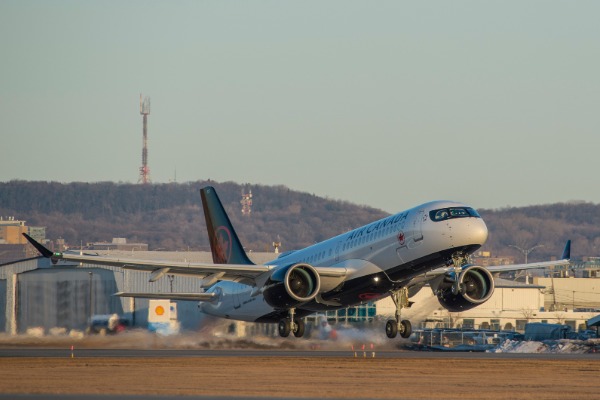Get Ready For Take Off

Finally, some good news.
And it comes with the expectation that there will be more ahead.
The conclusion of the long-awaited deal between the Canadian government and Air Canada has this country’s travel industry celebrating – virtually, of course – as the industry now looks ahead for announcements on further agreements with WestJet, Transat and Sunwing.
Hopefully, those announcements will come soon.
In announcing that it had reached an agreement with Air Canada, Deputy Prime Minister and Minister of Finance, the Honourable Chrystia Freeland, and the Minister of Transport, the Honourable Omar Alghabra made it clear that there were a number of key conditions for the government’s support.
Those conditions included ensuring that:
- Regional communities retain air connections to the rest of Canada through the restart of service at airports temporarily suspended by Air Canada.
- Any customer of Air Canada who wants a refund will receive one for certain pandemic-related cancelations.
- Airline jobs, pensions, and collective agreements are protected.
- Air Canada remains a customer for Canada’s aerospace sector.
The Honourable Chrystia Freeland, Deputy Prime Minister and Minister of Finance, said: “From coast to coast to coast, it is essential we maintain connections between people and our communities, large and small. Protecting Canadian customers is important. And maintaining a competitive Canadian air sector, Canadian airlines, and the thousands of good jobs in this sector is a priority. This is what today’s announcement with Air Canada guarantees.”
As a result, the federal government remains committed to supporting people who work in the air sector and Canadian airlines and during this unprecedented and difficult time for the industry.
It is also committed to supporting the gradual return of commercial activity in the aviation sector in Canada in a way that continues to prioritize the health, safety, and security of all Canadians.
The Honourable Omar Alghabra, Minister of Transport, said: “For our economic recovery and to build back better, we need a strong Canadian air sector that creates good jobs, grows the economy and helps connect communities across Canada. Today’s announcement with Air Canada is another important step in that direction.”
The federal government also indicated that negotiations continue with other Canadian carriers on financial support and any agreement reached in those negotiations will include a requirement that the airline also refund pandemic related-cancelations.
The statement noted that in the event that an airline does not need liquidity support from the government, the government remains open to helping all airlines provide voucher refunds to their customers.
It also said that the financial support announced on April 12, in the form of repayable loans and an equity investment, will help Air Canada weather the current economic downturn and will protect thousands of Canadian jobs.
Air Canada Unveils Details Of Deal
Air Canada has entered into a series of debt and equity financing agreements with the Canadian government that allows it to access up to $5.879 billion in liquidity through the Large Employer Emergency Financing Facility (LEEFF) program.
As part of the financial package, Air Canada has agreed to a number of commitments related to customer refunds, service to regional communities, restrictions on the use of the funds provided, employment and capital expenditures.
Two key of the key commitments for the industry include:
- Beginning April 13, 2021, it will offer eligible customers who purchased non-refundable fares but did not travel due to COVID-19 since February 2020, the option of a refund to the original form of payment. In support of its travel agency partners, Air Canada will not retract agency sales commissions on refunded fares.
- The resumption of service or access to Air Canada’s network for nearly all regional communities where service was suspended because of COVID-19’s impact on travel, through direct services or new interline agreements with third party regional carriers.
Michael Rousseau, president and Chief Executive Officer of Air Canada, said: “Air Canada entered the pandemic more than a year ago with one of the global airline industry’s strongest balance sheets relative to its size. We have since raised an additional $6.8 billion in liquidity from our own resources to sustain us through the pandemic, as air traffic ground to a virtual halt in Canada and internationally.”
Rousseau continued: “The additional liquidity program we are announcing today achieves several aligned objectives as it provides a significant layer of insurance for Air Canada, it enables us to better resolve customer refunds of non-refundable tickets, maintain our workforce and re-enter regional markets. Most importantly, this program provides additional liquidity, if required, to rebuild our business to the benefit of all stakeholders and to remain a significant contributor to the Canadian economy through its recovery and for the long term.”
Air Canada’s boss noted that: “As vaccine deployments ramp up, we continue to work with the Government of Canada on the evolution of safe and science-based test and quarantine relief measures with a view to safely restarting our sector. We know that Canadians are looking forward to re-connecting with friends and family and taking those long-awaited vacations and business trips and we will be ready to safely connect Canadians within Canada and Canada to the world.”
The financial package provides for fully repayable loans that Air Canada would only draw down as required, as well as an equity investment, and is comprised of:
- Gross proceeds of $500 million for Air Canada shares at a price of $23.1793 per share;
- $1.5 billion in the form of a secured revolving credit facility at a 1.5% premium to the Canadian Dollar Offered Rate (CDOR); the facility is secured on a first lien basis by the assets of Aeroplan Inc., Air Canada’s shares in Aeroplan as well as certain assets of Air Canada, including certain intellectual property relating to the Aeroplan loyalty program;
- $2.475 billion in the form of three unsecured non-revolving credit facilities of $825 million each with: the first, five-year tranche at a 1.75% premium to CDOR per annum; the second, six-year tranche at 6.5% per annum (increasing to 7.5% after 5 years); and the third, seven-year tranche at 8.5% per annum (increasing to 9.5% after 5 years);
- As part of the financial package, Air Canada issued an aggregate of 14,576,564 warrants exercisable for the purchase of an equal number of Air Canada shares, subject to customary adjustments, at a price of $27.2698 per share during a 10-year term, representing 10% of the total commitment available under the above secured and unsecured credit facilities; 50% of the warrants vested concurrently with the implementation of the credit facilities and the remaining 50% of the warrants will vest on a proportional basis to the amounts that Air Canada may draw under the above unsecured credit facilities;
- Up to approximately $1.4 billion in the form of an unsecured credit facility tranche to support customer refunds of non-refundable tickets. The facility will have a seven-year term and carry an annual interest rate of 1.211%.
As part of the financial package, Air Canada has agreed to a number of commitments related to customer refunds, service to regional communities, restrictions on the use of the funds provided, employment and capital expenditures. These include:
- Beginning April 13, 2021, offering eligible customers who purchased non-refundable fares but did not travel due to COVID-19 since February 2020, the option of a refund to the original form of payment. In support of its travel agency partners, Air Canada will not retract agency sales commissions on refunded fares.
- The resumption of service or access to Air Canada’s network for nearly all regional communities where service was suspended because of COVID-19’s impact on travel, through direct services or new interline agreements with third party regional carriers.
- Restricting certain expenditures, and restricting dividends, share buybacks and senior executive compensation.
- Obligations to maintain employment at levels which are no lower than those at April 1, 2021.
- The completion of the airline’s acquisition of 33 Airbus A220 aircraft, manufactured at Airbus’ Mirabel, Quebec facility. Air Canada has also agreed to complete its existing firm order of 40 Boeing 737 Max aircraft. Completion of these orders remains subject to the terms and conditions of the applicable purchase agreements.
The carrier also notes that in connection with the federal government’s equity investment, Air Canada has agreed to provide customary registration rights. The Air Canada shares and warrants issued to the government are subject to certain transfer restrictions as well as an exercise cap which limits the government’s aggregate voting rights from the shares acquired pursuant to this investment (including upon any exercise of the warrants) to 19.99%.


